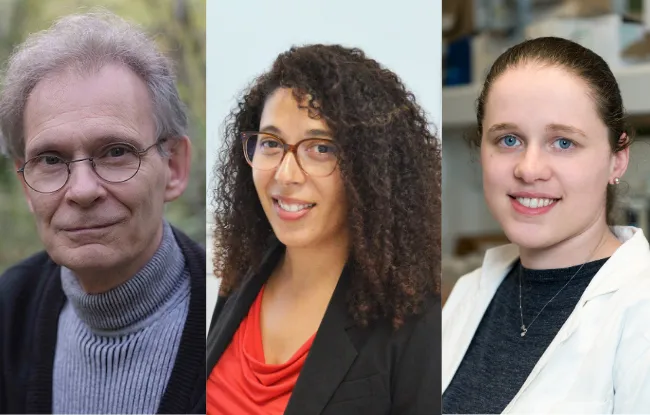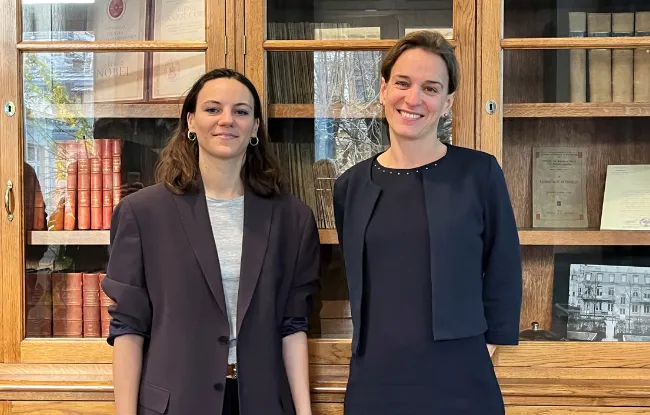- Home >
- Institut Curie News >
- At Institut Curie, from discovery to invention: supporting creativity for innovation in healthcare
Dr Cécile Campagne, director of the Technology Transfer Office at Institut Curie and deputy director of Carnot Curie Cancer.
While innovation is essential to competitiveness and economic development, as emphasized by the European Commission with Horizon 2020, it often tends to be perceived as a simple tool for preserving our current world.
”Yet science cannot move forward without boldness. We need to put this boldness, this ability to take risks, to explore uncharted paths, back at the heart of fundamental research. It's time to give researchers back the desire and support they need to embark on radically new paths, even if they don't guarantee immediate recognition,” explains Dr. Cécile Campagne.
Basic research, the foundation of innovation and scientific discovery
Basic research must be protected. It should not be seen as a cost, but as an essential investment in the general interest, as it is the driving force behind progress. It is indispensable for accelerating the development, marketing and access to new cutting-edge technologies to meet global challenges.
France is lagging behind in terms of financing and infrastructure. This translates into a loss of competitiveness on the international stage. France invests 2.2% of its GDP in research and development (R&D), compared with 3.5% for the United States[1], which is holding back its competitiveness and causing it to lose its global position in innovation. France now ranks 9th in the world in terms of scientific publications[2], down from 6th place in 2005[3].
State-led initiatives such as the France 2030 plan, which allocates 30 billion euros to tomorrow's strategic sectors, offer France the opportunity to regain a leading position on the international stage. However, sustained efforts are still needed to make this ambition a reality, as Dr. Cécile Campagne points out: "Without sufficient, long-term investment in research, France will become increasingly dependent on foreign innovations, particularly in key sectors such as healthcare and technology. This would compromise the country's scientific and economic sovereignty."
Giving researchers back their freedom, the means to act and fair recognition
France has some of the best researchers in the world. American companies invest far more in R&D than European healthtechs, and European venture capitalists raise 3 to 4 times less capital than in the US[4], contributing to the flight of talent and companies abroad. Some promising BioTechs have had to turn to the USA very early on to access the substantial funding they need to grow, for lack of similar opportunities in France, despite their strong domestic potential.
“An estimated one in four researchers would like to embark on an entrepreneurial adventure,” says Dr. Cécile Campagne. “In a scientific career, researchers who have undertaken and innovated have not always received the same recognition as those who published in the leading journals.” It's a paradox that the Technology Transfer Office (TTO) department is working hard to reverse, by showing researchers all the potential this avenue of exploration and creativity offers.
"It's also a question of changing our mentality: France and Europe must rediscover a taste for risk, stop spreading funding too thinly over numerous small projects, and invest massively in the most promising initiatives, while accepting the financial risks associated with innovation.”
Innovation implies risk-taking and stems from the intellectual autonomy of researchers, far from the constraints of short-term results. To achieve this, they need stable, long-term funding to bring their projects to fruition, as described by Dr Christel Goudot, a bioinformatics research engineer in the Immunity and Cancer unit at Institut Curie, and holder of several patents: “Obtaining funds to finance our research is now a key factor in our decision to pursue these avenues of commercialization.”
For example, start-ups need to be supported throughout their development, from research to industrialization, with ongoing funding at every stage to ensure a financial continuum between idea, proof-of-concept, start-up and scale-up.
“In addition to what we do on a daily basis to support inventors, the support of political decision-makers and companies is vital to preserve this desire to innovate,” explains Dr. Cécile Campagne. "Today, voices are being raised within the healthcare innovation ecosystem to defend the status of researcher-inventors: a paradigm shift that is essential to welcome. However, it is imperative that public authorities take concrete steps to improve research funding at all stages. This includes long-term policies to support researchers and modernize research institutions."
Building an ecosystem that encourages scientific freedom and protects researchers, and investing in all the links in the innovation chain: this must be a common objective shared by all public and private players.
Tailor-made support, from the birth of an invention to its exploitation
Academic research is at the origin of scientific breakthroughs that will have a major impact on society, provided we can identify them and offer them the means to become reality. “At Institut Curie, our strength lies in investing heavily in the earliest stages of technology transfer, i.e. the detection and maturation of inventions, alongside increased awareness-raising, employee training and tailor-made support, “ says Dr. Cécile Campagne.
At Institut Curie, the importance of commercializing research and technology transfer is reflected in a dedicated team of 22 professionals in Technology Transfer Office (TTO), who advise and guide inventors from the Research Center or the hospital complex. "Before the creation of a dedicated department, Institut Curie knew little about the transfer process. Having this kind of support has been a real booster for the valorization of our research and for stimulating the interest of the medical-scientific community in innovation in healthcare,” testifies Prof. Jean-Louis Viovy, physicist, CNRS emeritus research director in the Cell Physics and Cancer unit at Institut Curie, behind more than 20 patents and multiple successful start-ups.
The challenge for TTO? To bring out the innovative potential of researchers, doctors and caregivers, and support them as their projects mature, leading to a license or collaboration with a company, or even the creation of their own start-up through an integrated incubation program.

To meet these challenges, a number of strategic axes and measures are being implemented to encourage innovation within the institute:
- Enabling researchers to make the most of their path to innovation through:
- Personalized support from expert teams, covering all aspects of technology transfer: maturation, intellectual property strategy, market analysis, licensing, industrial collaborations, start-up creation, etc.
- Training, awareness-raising and detection initiatives, notably with the creation of an internal network of Tech Transfer Ambassadors made up of Institut Curie employees, to detect inventions more quickly in the laboratories.
- Support for project funding via the Carnot label of excellence, which Institut Curie has held since 2011, or via external calls for projects.
- Personalized support from expert teams, covering all aspects of technology transfer: maturation, intellectual property strategy, market analysis, licensing, industrial collaborations, start-up creation, etc.
- An incentive policy in favor of innovation: educational initiatives, remuneration of inventors, provision of time dedicated to entrepreneurship through deliberations of the Institut Curie Board of Directors, recognition and visibility for projects undertaken.
- Adopt a policy of constant questioning and continuous improvement of Institut Curie's innovation policy: create a Tech Transfer committee, made up of researchers and doctors, to co-construct the medical-scientific strategy, or an advisory committee of international specialists to contribute their expertise and challenge the Institute's transfer strategy.
Innovation at Institut Curie: key figures since 2011
inventors at Institut Curie
new invention and software declarations per year
patents from 260 families
start-ups created (since 2002)
M€ raised by start-ups since their creation
M€ generated by partnered research (excluding clinical research)
collaboration contracts signed





